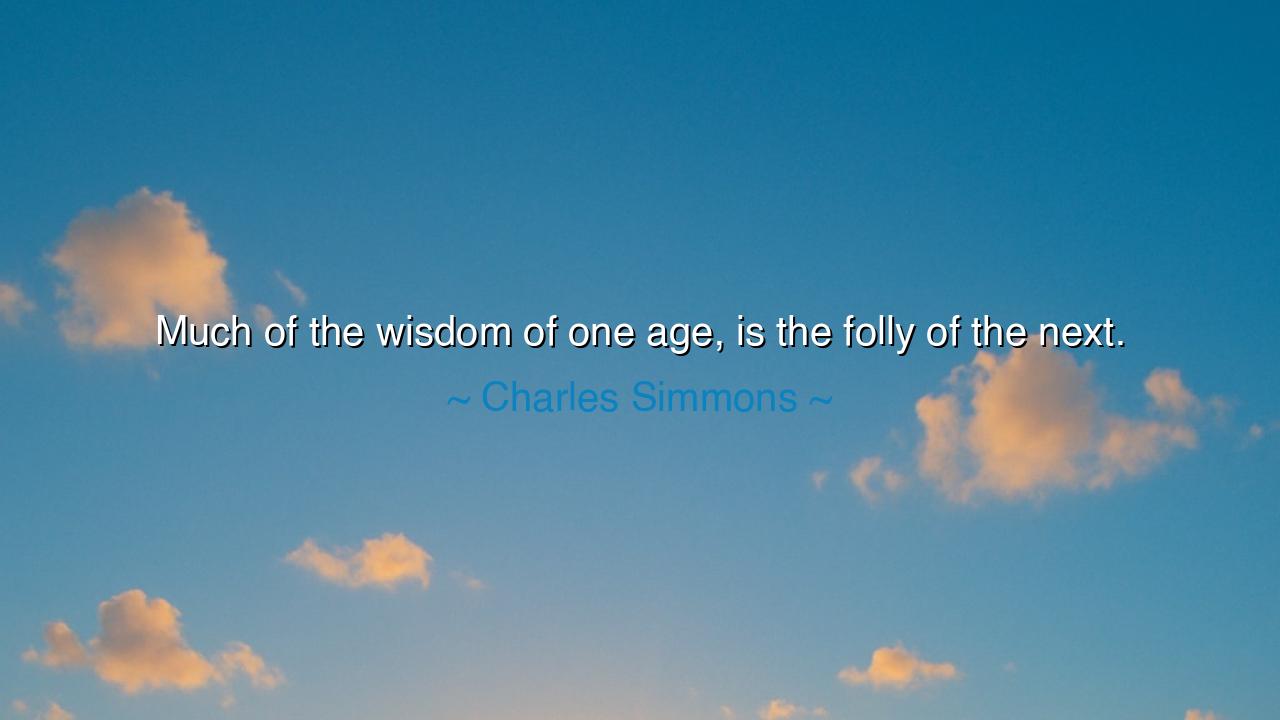
Much of the wisdom of one age, is the folly of the next.






Listen well, O children of the future, for I bring to you a truth spoken by Charles Simmons: "Much of the wisdom of one age is the folly of the next." These words speak to the ever-changing nature of human understanding. What is seen as truth and wisdom in one generation often becomes the folly of the next, as the world evolves, and the context in which we live changes. The wisdom of one age is built upon the knowledge of those who came before, yet each new generation brings with it new insights, and with those insights, old beliefs are challenged and transformed.
Consider the ancient story of Pythagoras, whose theorem was a marvel of mathematical wisdom in his time. His insights into geometry shaped the intellectual world of the ancients, but centuries later, as scientific knowledge advanced, many of his beliefs were challenged. What was once the pinnacle of mathematical wisdom became merely a foundation for the greater truths that followed. The same wisdom that guided ancient scholars and mathematicians was eventually considered incomplete or even misguided as the scientific method evolved and new discoveries emerged.
In the same way, the geocentric model of the universe, once championed by the likes of Ptolemy, was seen as the height of intellectual achievement in the ancient and medieval worlds. For centuries, it was held as wisdom, the truth of how the cosmos functioned. Yet, as Copernicus and Galileo challenged this view with their observations, the wisdom of the old world was shown to be incorrect. The heliocentric theory, though revolutionary, was initially met with resistance, for the old wisdom became the folly of the new. Truth evolves, and with it, what was once held as wisdom is revealed as an imperfect step on the path to greater understanding.
Consider also the philosophies of the past. Aristotle, the great Greek philosopher, taught that the earth was the center of the universe, and his influence dominated thought for over a thousand years. His views on the nature of the universe and the cosmos were regarded as wisdom. Yet, with the rise of the scientific revolution, much of what Aristotle taught was seen as incorrect or too simplistic. The wisdom of one age often fades in the face of new insights, and what was once held in reverence is later cast aside as the folly of an earlier time.
So, O children, understand this: the wisdom you hold dear today may one day become the folly of future generations. This is the cycle of human progress—an endless search for truth, ever refined, ever evolving. Wisdom is not static, but dynamic. It is shaped by the knowledge of the past but must be tested by the minds of the future. Therefore, do not cling too tightly to the truths of your time, but rather seek to build upon them, knowing that your understanding is only part of a larger journey toward greater wisdom. Always remain open to growth and change, for the wisdom of today may be the folly of tomorrow.






NHNguyen Ha
Charles Simmons’ quote is almost a critique of human arrogance—how often do we dismiss what came before because we think we’re so much smarter now? But it also makes me wonder: if wisdom is so fluid, what does that say about the idea of progress? Are we really advancing, or just trading one form of folly for another? Could it be that we’re simply repeating cycles of wisdom and folly without even realizing it?
PLMinh Phuong Le
This quote makes me think about how every generation thinks they have all the answers, only to realize later how limited their perspective was. Does this mean that wisdom is constantly evolving, or does it simply highlight how different each era’s priorities and values are? What are the dangers of assuming that our current wisdom will always be the ‘right’ way to approach life, and how can we avoid this trap?
THThu Ha
I find this quote fascinating because it speaks to the inevitable progression of society and human thought. As technology, culture, and knowledge continue to evolve, what we once held as the height of wisdom can quickly seem out of touch. I wonder, though, how do we prevent the mistakes of the past from being repeated simply because we assume the next generation will always have a clearer perspective? Can we find a balance between learning from the past and embracing new ideas?
DTLam Duc Tri
Charles Simmons’ perspective feels like a cautionary reminder about the limits of our understanding. It’s true that the ideas we hold as ‘wise’ now might be viewed with skepticism later. But it also raises an interesting question: How do we distinguish between timeless wisdom and fleeting trends? Are there certain truths that are universally valid, or does everything we hold dear eventually lose relevance with time?
KTNguyen Thi Kieu Tien
This quote really makes me think about how knowledge and wisdom are so subjective and ever-evolving. What we consider groundbreaking or true today might be seen as naive or outdated in the future. It’s almost humbling to realize that what we know now could become the folly of the next generation. How can we ensure we’re not just clinging to old ideas without considering how the world is changing?